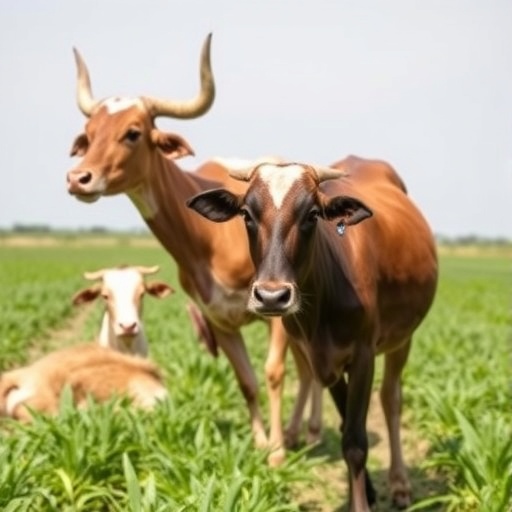In the complex web of sustainable agricultural practices, a groundbreaking study sheds light on the dynamic relationship between crop cultivation and livestock rearing, revealing critical insights from the Afar National Regional State. This unique region becomes a living laboratory, where traditional agricultural systems are interwoven with modern practices, showcasing the nuances of crop-livestock integration. Pioneered by researchers, this study delves deep into the degree of integration and the driving forces behind these agricultural practices, paving the way for sustainable development in comparable ecosystems globally.
As the world grapples with food insecurity exacerbated by climate change, understanding the interplay between crops and livestock is more crucial than ever. This insightful research investigates how farmers in the Afar region navigate the challenges posed by their environment. The researchers reveal that crop-livestock integration is not merely a farming choice but a survival strategy shaped by climatic conditions, market accessibility, and socio-cultural dynamics. Farmers have become adept at using available resources, optimizing their production systems to extract maximum utility from both crops and livestock.
One of the most compelling aspects of the study is its micro-level approach, which allows for a detailed examination of individual farmer experiences. This methodology highlights the diversity of practices among farmers, reflecting varying degrees of crop-livestock integration based on personal circumstances and environmental factors. By examining these nuanced experiences, the researchers capture the complexity of agricultural decision-making and underscore the importance of context in formulating sustainable agricultural practices.
The findings reveal that in the Afar National Regional State, crop-livestock integration ranges widely, with some farmers adopting fully integrated systems while others maintain distinct separation in their agricultural practices. This variation often correlates with the availability of water resources, land quality, and access to markets. Farmers who successfully integrate crops and livestock report higher productivity and enhanced resilience against climatic shocks, offering a powerful testament to the potential benefits of this approach.
Moreover, the study underscores the role of traditional knowledge in shaping contemporary practices. The rich cultural heritage of the Afar community provides a foundation for farmers to learn from their predecessors, blending time-honored methods with innovations that respond to modern challenges. By fostering an environment where traditional and modern agricultural practices coexist, farmers are better equipped to tackle the pressing issues of food security and sustainable land use.
Economically, the integration of crops and livestock can offer significant benefits. The researchers note that livestock provides not only manure as a natural fertilizer, enhancing soil fertility, but also serves as a buffer against market fluctuations. When crop prices fall, livestock can be sold to sustain livelihoods, providing a safety net that is particularly vital in economically vulnerable regions. This duality of function exemplifies the interconnectedness of agriculture and highlights the necessity of understanding these relationships when evaluating agricultural strategies.
However, the study also identifies challenges that impede greater integration. Issues such as access to veterinary services, seed quality, and the effects of climate change pose significant threats to farmers’ livelihoods. The researchers emphasize the need for policies that enhance resource availability, support sustainable practices, and build resilience against environmental stressors. Investing in infrastructure and services crucial to both crop and livestock production could significantly improve the well-being of the farming community.
As the global agricultural landscape continues to evolve amidst climate change and population growth, learnings from the Afar region could inform broader discussions on sustainable practices worldwide. The integration of crops and livestock can serve as an essential model for other regions facing similar environmental and socio-economic challenges. Emphasizing adaptability and resilience will be crucial for global agricultural systems in future years, particularly as they confront the realities of a changing climate.
In conclusion, this enlightening study presents a case for stronger integration of crops and livestock as a viable solution to many pressing agricultural issues. As agricultural development moves forward, it will be essential to bridge the gap between research and practice, ensuring that lessons learned from unique environments like the Afar National Regional State can be scaled and applied in other contexts. Insights from this research urge stakeholders, policymakers, and farmers alike to recognize and harness the synergistic potential of integrated farming systems.
The implications of the researchers’ findings extend beyond the Afar region, offering a standard framework for fostering sustainable agriculture globally. By integrating traditional knowledge with modern agricultural techniques, rural communities can build resilient systems capable of adapting to the myriad challenges that lie ahead.
The call to action is clear: to ensure food security, bolster livelihoods, and promote environmental sustainability, it is time to embrace the power of crop-livestock integration. This study champions a future of agriculture that holds promise for enhanced food security, sustainable land use, and resilient rural livelihoods. Each farmer’s approach serves as a critical touchstone, reflecting the intricate balance between humanity and our natural resources in ensuring a sustainable future.
Subject of Research: Crop-Livestock Integration in Afar National Regional State
Article Title: Degree and drivers of crop-livestock integration based on micro-level study evidence from Afar National Regional State
Article References:
Adem, M., Eunice, B.L.G. Degree and drivers of crop-livestock integration based on micro-level study evidence from Afar National Regional State.
Discov Sustain (2025). https://doi.org/10.1007/s43621-025-02294-3
Image Credits: AI Generated
DOI: Not provided
Keywords: Crop-livestock integration, sustainability, Afar National Regional State, food security, traditional knowledge, agricultural practices.




